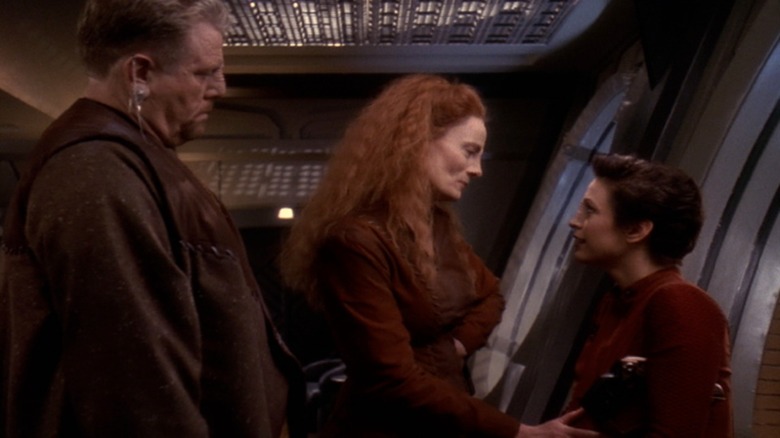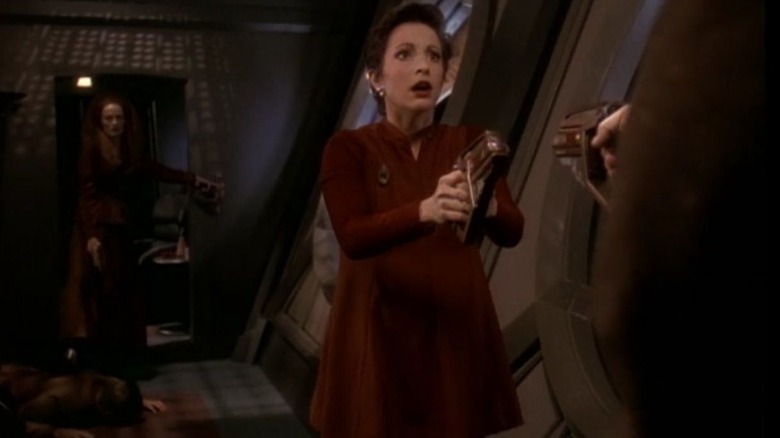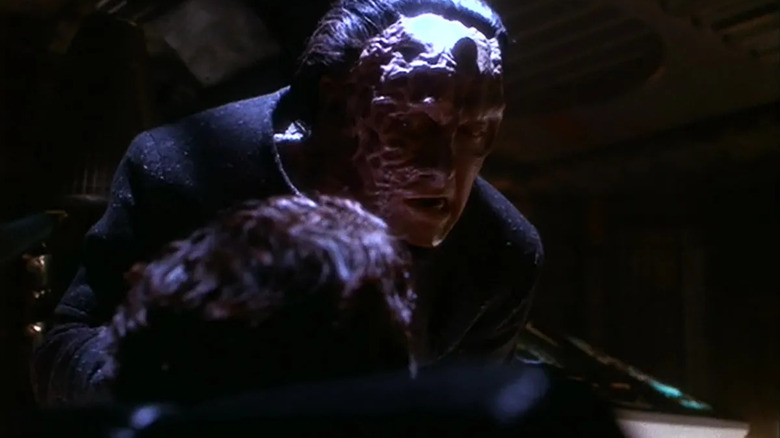How An Agatha Christie Novel Inspired One Of Star Trek DS9's Most Disturbing Episodes
Because "Star Trek: Deep Space Nine" was set in such a politically fraught universe, it was always eager to tackle difficult stories about moral ambiguity. The title space station is located near the planet Bajor, which had been, up until recently, militarily occupied by the Cardassians, a fascistic species devoted to military strength and Bajoran extermination. "Deep Space Nine" takes place right as the Cardassian occupation had ended and witnessed Bajor entering into a long and tricky restoration phase. A lot of "Deep Space Nine" was about the rising corrupt Bajoran theocracy that was elbowing their way into the power vacuum.
Major Kira (Nana Visitor) was the Bajoran first officer on board DS9, and she spent the show learning to live with her military past. During the occupation, Kira took many, many Cardassian lives as a member of the Bajoran Resistance. As one might expect, she was deeply wounded and infinitely hateful toward the species that almost killed off her entire planet.
In the fifth season episode "The Darkness and the Light" (January 6, 1997), Kira reunited with several other former members of her Resistance Cell, and, for a few moments, she was able to bond with others who were just as wounded as she. It seems, however, that a mysterious assailant is seeking out Kira's former Cell members and murdering them one by one. Kira needs to begin considering her violent wartime crimes.
This is a fine story for "Deep Space Nine." However, as it so happens, it was also the story for Agatha Christie's 1939 novel "And Then There Were None" (which was renamed after its original title was quickly deemed offensive). Christie's story was also about a group of people invited to a remote island to face their wartime crimes, all while a murderer lurks among them.
And Then There Were DS9
Some of Kira's old Resistance companions come to the station to investigate a crime. They are Fala (Jennifer Salvidge), Furel (William Lucking), and Lupaza (Diane Salinger). Another mutual friend of theirs, a character named Latha, was murdered in church at the start of the episode, with the murderer sending a coded message, beginning a grotesque countdown. "That's one," the murderer says. Kira and her compatriots are on edge and don't know who wants them dead. The murderer will kill at least two more of the characters before the episode ends.
The bulk of "The Darkness and the Light" is an exciting murder investigation led by Security Chief Odo (René Auberjonois) and involves Kira's increasing fear and paranoia over the potential suspects. The episode has a bleak tone, with Kira's war violence always lurking behind every conversation. Kira felt entirely justified in her violent acts during wartime, but "The Darkness and the Light" reveals that others may not be able to sympathize with her sense of resolution. Eventually, Kira becomes impatient with the investigation and steals a private list of suspects from Odo so that she can confront the murderer herself.
She finds that the murderer is a Cardassian named Silaran Prin (Randy Oglesby), a man with a large facial scar. It seems that Prin was injured in a bomb that the Resistance set during the Occupation and he has taken it upon himself to kill those responsible for scarring him and killing his family. Kira argues that it was war and that her goal was to kill Cardassians. Prin reveals, however, that he was not a soldier but a mere civilian who was merely working as a launderer in the home she bombed. He wasn't violent until Bajorans made him that way.
War begets war begets war
Prin, it should be noted, is out of control. He has become obsessed with revenge to the point of perceiving light as a truth-offering substance. He refers to Kira as "the creature." This contributed to his violent revenge scheme. Kira accuses Prin of being a bitter old man hellbent on revenge, to which he replies that his acts of killing were reserved only for those he deemed to be guilty. He, unlike Kira, never sought to injure innocent people. It's telling that Kira doesn't even know who Prin is until he introduces himself.
Kira ends up killing Prin in self-defense. Her war efforts never ended, it seems. Years after the fact, war was still claiming victims. Kira, meanwhile, is shaken but may feel ambivalent. "Sometimes innocence," she says, "is just an excuse for the guilty." Is she referring to Prin or to herself? The ending is open for interpretation and opens an interesting discussion. Kira bombed a Cardassian house after the main occupant murdered 15 Bajorans. Her bomb killed 23. Was Kira in the right to murder civilians during wartime as revenge? Is Prin's revenge justified? If one begins to morally justify the killing of civilians during wartime, then one has started down a slippery moral slope that can lead to a flippant justification of violence.
This sort of wartime analysis, of course, isn't a huge part of Agatha Christie's original novel, but bitter revenge is. In Christie's vision, several people were murdered in a remote estate, with some taking their own lives. It seems that a mixture of bloodlust and an overblown sense of justice led to a mix of revenge killings and self-slaughter. I wouldn't dream of revealing the ending of an Agatha Christie novel, but one can see its DNA in "DS9."


